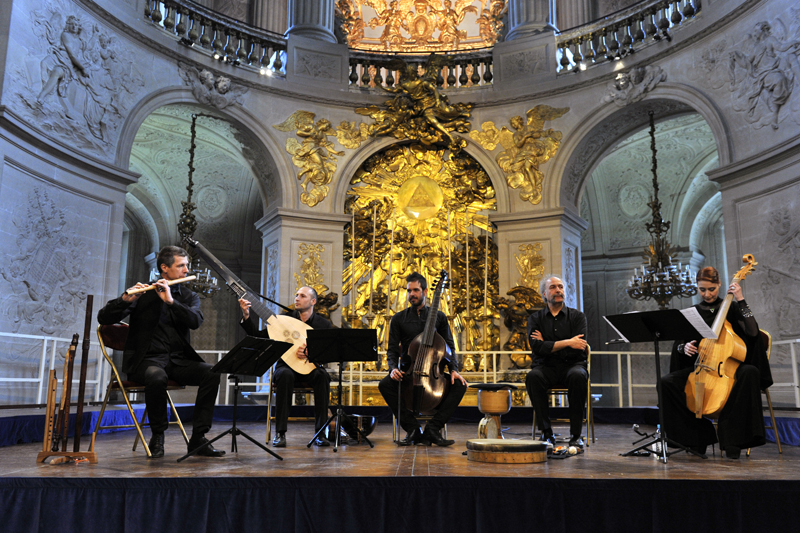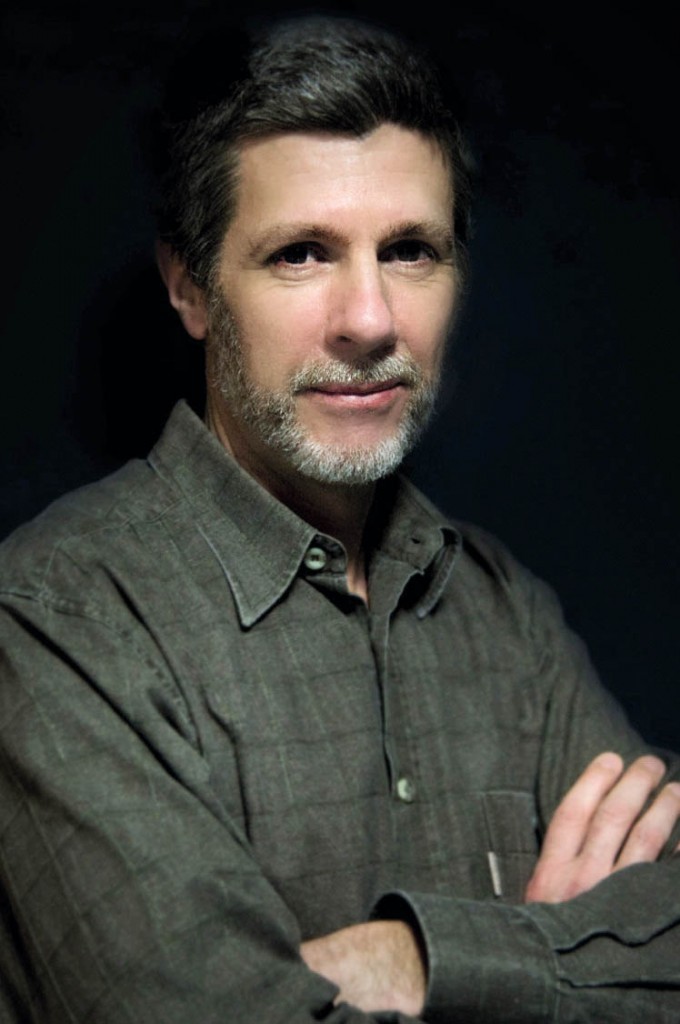 The parish church of Ferreira do Alentejo, the town that Lands without Shadow Festival visits this year for the first time, it hosts tomorrow, April 16, at 21 pm, the first concert dedicated to Brazil, in charge of the French ensemble «Le Baroque Nomade».
The parish church of Ferreira do Alentejo, the town that Lands without Shadow Festival visits this year for the first time, it hosts tomorrow, April 16, at 21 pm, the first concert dedicated to Brazil, in charge of the French ensemble «Le Baroque Nomade».
It is one of the most famous international groups for its historically informed interpretation of the dialogue that took place in the XNUMXth century between the European repertoire and musical traditions from other times and from other places, such as China, Turkey, Ethiopia – and, of course, Brazil.
Directed by Jean-Christophe Frisch and guided by the purpose of revealing authors and scores doomed to oblivion, «Le Baroque Nomade» presents, according to the Festival organizers, «a project full of meaning: it undeniably invites you to discover the long period of musical exchanges that spans between the XNUMXth century and the present».
The presence of "exceptional performers", such as soprano Cyrille Gerstenhaber, mezzo-soprano Sarah Breton, tenor Vincent Lièvre-Picard, baritone Emmanuel Vitorsky and organist Mathieu Dupouy, all of whom are well-known personalities in the international art world, offers a secure passport for this unique “turn-trip”.
«Pelo Mar, pelo Sertão: Music from Brazil in the Times of the United Kingdom and the Empire» is the title of the concert that places, side by side, works by Luís Álvares Pinto (1719-1789), one of the first Brazilian composers, born in Recife and trained in the cathedral of Lisbon; of Fr José Maurício Nunes Garcia (1767-1830), the great master of Rio de Janeiro at the time when D. João VI established his court in this city, someone who stood alongside some of the best musicians of the time; and by a European artist, the Austrian Sigismund von Neukomm (1778-1858), who lived in the Brazilian capital between 1816 and 1821 and was familiar with the musical traditions of the New World.
Given the exceptional acoustics of Ferreira's matrix, everything goes together to make this concert one of the highlights of this edition of the Festival Terras sem Sombra.
The initiative is carried out in partnership with the local Town Hall and Parish. It is also a way of paying homage to a native of this town, Armando Sevinate Pinto, former Minister of Agriculture, who died in 2015. Greatly in love with rural life and the Alentejo, whom he knew like few others, he was the first chairman of the Board of Curators of the Festival Terras sem Shadow.
After a «brilliant interpretation» by Alberto Zedda in the parish church of Santiago do Cacém, on April 2, which, according to the Festival organizers, «elevated Alentejo to the first line of international sacred music», the program now follows, with other exceptional musicians, in the parish church of Ferreira do Alentejo.

The 12 Lands without Shadow Festival receives, as a guest country, Brazil – a choice that reflects its historic connection, built over centuries and recently renovated, to the Alentejo.
Since the 1776s, the Brazilian territory has been the destination of countless people from the Alentejo, many of whom (or their descendants) returned to the region where they had their origins. At times, they were real collectives to be transplanted to the tropics, as happened with the regiment of Moura that stood out in Rio Grande do Sul, in XNUMX.
All of this would translate, after all, into a true “make-trip” movement: many of the ideas, beliefs, artistic and cultural manifestations and, particularly, the musical traditions that transferred from Portugal to Brazil, returned to us , already transformed and already profoundly enriched, not only by the contributions of the Amerindian nations and the extraordinary African heritage, but also by the affirmation of the Brazilian identity itself.
Anyone looking carefully at the Alentejo cultural landscape can beware of the resulting innovations. It is worth remembering some cases, such as the tropical variants that enriched the orange groves that came from the time of the Moorish mints or certain touches of refinement in some dishes – and, above all, in some sweets – typical of the sumptuous regional cuisine; but whoever is curious to know how to listen to Alentejo's “fashions” will not fail to glimpse, in this or that of its sounds, the distant influence on the other side of the Atlantic.
A very eloquent testimony is carried out by the religious architecture: the church of Nossa Senhora da Assunção, in Messejana (Aljustrel), destroyed by the earthquake of 1755, was rebuilt by one of the many architects and engineers that Sebastião José de Carvalho e Mello, future Marquis of Pombal, brought from all over the Portuguese empire to rebuild Lisbon in ruins. With its foreshortened towers, this sanctuary leads us mysteriously, through a long journey, to Bahia and the villages of the interior of Minas Gerais.
These and other realities are not surprising, after all, if we think – as José António Falcão, a historian who has been studying the presence of the Brazilian legacy in Baixo Alentejo, pointed out – that António Raposo Tavares, the São Paulo pioneer who roughly traced the borders of now Brazil, belonging to a family of New Christians from Beja, was born in the village of Espírito Santo, in the interior of Mértola.
During his research in the Alentejo archives, Falcão has made other discoveries worthy of note, one of which is unexpected: Martim Soares Moreno, the famous founder of Ceará, was a native of Santiago do Cacém.
It was the awareness of these and other connections, deep but forgotten, that led Juan Ángel Vela del Campo, artistic director of the Shadowless Lands, subtly tracing, within the Festival's 2016 program, a coherent cycle that allows the European audience to have a very complete perspective of the Brazilian musical identity, from the Baroque era to the great creators of today.
Preserving an island of biodiversity in the middle of the ocean for agro-industry
On Sunday morning, April 17, at 10:00 am, musicians, spectators and the local community will join together for an action to safeguard biodiversity, under the motto Pilgrim Inn: the Lagoa dos Patos, Biodiversity Island in the Olive Ocean, which seeks to identify management practices favorable to biodiversity in a context of intensive agriculture in the irrigation blocks benefiting from the Alqueva reservoir.
Although known as Lagoa dos Patos, the wetland area targeted by the initiative, on the border between the municipalities of Ferreira do Alentejo and Alvito, brings together two reservoirs, resulting from dams intended to accumulate water to supply rice fields located to the south and west of these.
This activity aims to characterize the spring diversity of birds existing there, relating it to the very characteristics of such a unique place, but threatened by the multiplication of areas devoted to agro-industry and its powerful technological means, sometimes problematic for conservation from nature.
The action, open to all interested parties, is coordinated by the Institute for the Conservation of Nature and Biodiversity, in partnership with the Municipality of Ferreira do Alentejo. It translates, on the ground, a concern that is evident in the Encyclical Report Yes, by Pope Francis: “Roads, new crops, reserves, dams and other constructions take over habitats and sometimes fragment them in such a way that animal populations can no longer migrate or move freely, so some species are at risk of extinction”.
Free entry, the Festival is organized by the Department of Historical and Artistic Heritage of the Diocese of Beja and lasts until 2 July and continues on to Odemira, Serpa, Castro Verde and Beja. A hymn to Baixo Alentejo: to the beauty of its natural spaces and the pleasure of cultural discovery.
FERREIRA DO ALENTEJO Program
April 16, 2016 [21:30 pm]
Mother Church of Our Lady of the Assumption
By the Sea, by the Sertão: The Music of Brazil in the Time of the Kingdom and the Empire
XVIII-21/Le Baroque Nomade
Soprano Cyrille Gerstenhaber
mezzo-soprano Sarah Breton
Tenor Vincent Lievre-Picard
Baritone Emmanuel Vitorsky
organ and piano Mathieu Dupouy
Flutes, serpent and musical direction Jean-Christophe Frisch
April 17th [10:00 am]
Pilgrim Inn: Lagoa dos Patos, Biodiversity Island in the Olive Ocean

















Comments